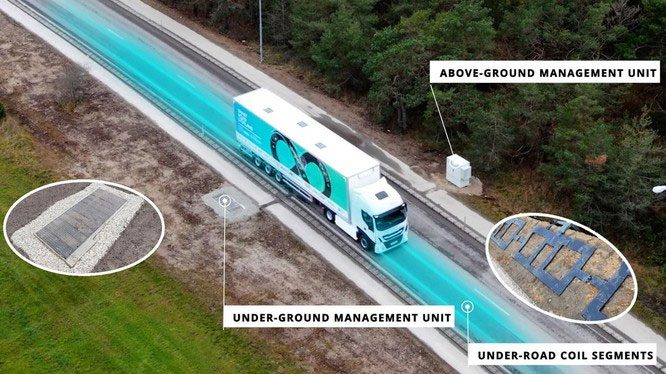In Balingen, Germany, dynamic wireless charging technology for electric vehicles has been tested in real-world conditions for the first time, charging a shuttle bus for the Garden Show 2023 while it is in motion.
The United States has dealt another blow to the Chinese chip industry by placing 36 companies on its blacklist. Two former Twitter employees are developing a platform called Spill as an alternative to Musk’s social media network. Additionally, a four-legged robot capable of climbing walls and ceilings made of metal structures, such as large oil tanks, has been introduced.

Wireless electric vehicle charging technology tested in Germany. (Image eVehicle Technology).
ElectReon, an Israeli company specializing in inductive charging for electric vehicles, has established the Electric Road System (ERS), initially extending 400 meters under a layer of asphalt for the project, along with two fixed inductive charging stations. In the later phase of the project, this prepared stretch of road is expected to be extended to one kilometer.
Besides Electreon Germany, project partners include EnBW, a leading electric vehicle charging infrastructure provider in Germany, the Karlsruhe Institute of Technology (KIT), and the utility company Stadtwerke Balingen. The entire project is also managed and sponsored by the German Aerospace Center (DLR), operating under the name ELINA (Einsatz dynamischer Ladeinfrastruktur im ÖPNV).
The route for the shuttle bus to the Garden Show runs from the parking lot within the exhibition grounds to the city hall bus stop. According to the project manager from EnBW, the dynamic charging process occurs on Wilhelmstraße. Here, magnetic coils are embedded under the roadway. “When the bus approaches the charging point, a high-frequency magnetic field is generated. Under the influence of this magnetic field, current is induced in the receiving coils on the bus floor, which is used to charge the battery,” EnBW describes the charging process.
Static inductive charging points are also planned at the final stops, which are the city hall “Stadthalle” and the exhibition center “Messegelände” – but the bus will be charged there while it is stationary. In the second phase of the trial, scientists responsible for the project aim to equip additional routes in Heimlichenwasen and in front of Lauwasen school with magnetic coils, extending the dynamic electric road system to 1 kilometer. Additionally, another static inductive charging stop is planned in the bus depot, which will expand the project to include conventional charging services.
ElectReon provides Dynamic Wireless Power Transfer (DWPT) technology, while KIT contributes a planning tool to optimally coordinate the dynamic charging route and the locations of static inductive charging stations. Dr. Markus Tesar, a researcher from KIT, stated: “The software integrates traffic modeling, vehicle simulation, and charging infrastructure optimization. Our goal during the implementation of the ELINA project is to validate the new planning tool with data from actual operations in Balingen.”
Stadtwerke Balingen is responsible for operating the electric buses and managing the EnBW project, as well as for establishing and operating the electric charging infrastructure. Alexander Pöllauer from EnBW’s Research and Development department, who leads the trial, emphasized: “The project in Balingen demonstrates our commitment to creatively and consistently promoting electric transportation in Germany. We are presenting a comprehensive approach towards suitable wireless charging capabilities in the technical field of public transport in Germany. This direction also includes convincing authorities, network operators, bus operators, and the general public of the possibilities.”
According to a statement from ElectReon, this is not the first trial of DWPT technology in Germany. The Balingen project follows a successful pilot project with Electreon’s technology in the city of Karlsruhe in collaboration with EnBW. EnBW stated in its own corporate announcement: “An inductive electric charging technology road has been installed at EnBW’s training center, supplying power to public buses during peak hours.”
ElectReon and the road construction company Eurovia are planning another project in Germany, funded by the German government, named E/MPOWER. Launched in July 2022, the project aims to integrate Electreon’s technology along a one-kilometer stretch of highway in northern Bavaria.
Currently, the focus of the testing activities is on Balingen. Under this project, Electreon stated it would receive approximately 3.2 million euros for its implementation work.


















































